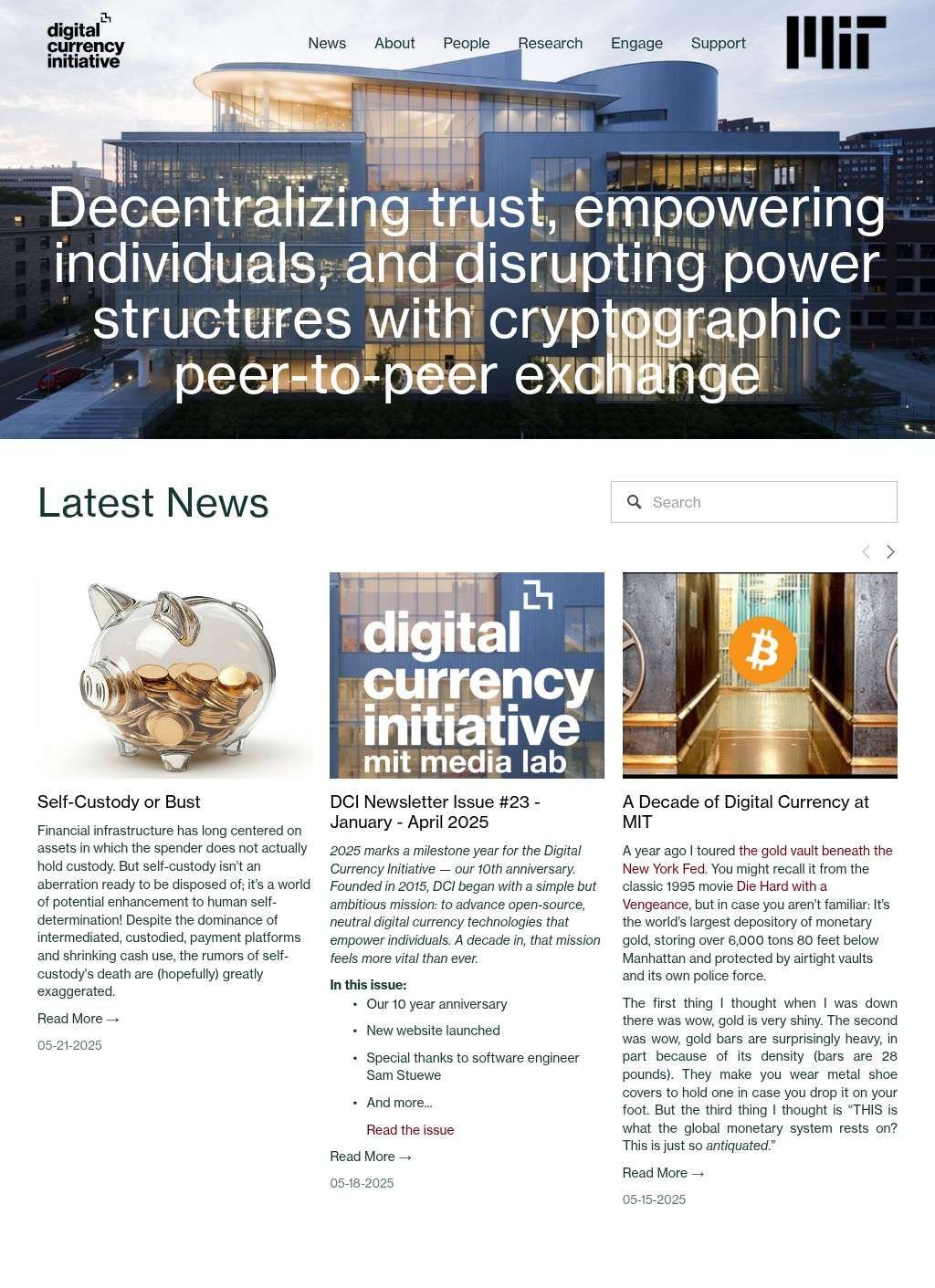The MIT Digital Currency Initiative emerged from a critical moment in cryptocurrency history, when academic leadership became essential for advancing blockchain technology beyond its anarchist origins. Founded at the MIT Media Lab in 2015, this research initiative has evolved into one of the world's foremost academic centers studying digital currencies and distributed ledger systems. The initiative brings together computer scientists, economists, cryptographers, and policy experts to tackle fundamental questions about how cryptocurrencies can reshape global finance while addressing concerns about security, privacy, and scalability.
At its core, the DCI operates as a neutral research environment where rigorous academic inquiry meets practical blockchain development. Unlike commercial ventures driven by profit motives or regulatory bodies focused on compliance, the initiative pursues knowledge for its own sake while remaining mindful of real-world implications. Researchers at DCI contribute to Bitcoin Core development, design experimental central bank digital currencies, and explore novel cryptographic techniques that could enable more private and efficient digital transactions. This work happens in an open, collaborative environment that embodies MIT's commitment to advancing technology for societal benefit.
The initiative's research portfolio spans an impressive range of projects addressing critical challenges in cryptocurrency adoption. One flagship effort involves collaboration with central banks worldwide to explore how digital currencies issued by monetary authorities might function. The Hamilton project, developed with the Federal Reserve Bank of Boston, demonstrated a high-performance transaction processor capable of handling central bank digital currency operations at scale. Other research threads investigate smart contract security, blockchain interoperability, and the environmental impact of cryptocurrency mining. Each project contributes pieces to the larger puzzle of how digital currencies might integrate with existing financial systems.
DCI researchers regularly publish groundbreaking papers that advance academic understanding of cryptocurrencies. Topics range from technical improvements to consensus mechanisms to economic analyses of token distribution models. The initiative launched Cryptoeconomic Systems, a peer-reviewed journal dedicated to interdisciplinary blockchain research. This publication provides a venue for rigorous academic work that might not fit traditional computer science or economics journals. Through conferences, workshops, and online resources, DCI disseminates knowledge to researchers, developers, and policymakers worldwide.
Education forms a vital component of the Digital Currency Initiative's mission. While not offering formal degree programs, DCI provides numerous learning opportunities for MIT students and the broader community. Graduate students work as research assistants on cutting-edge projects, gaining hands-on experience with blockchain development and cryptocurrency economics. The initiative hosts seminars featuring leading figures from academia and industry, creating dialogue between different perspectives on digital currency development. Online resources, including recorded lectures and technical documentation, make DCI's educational content accessible globally.
The initiative maintains strong connections with the cryptocurrency development community while preserving academic independence. DCI researchers contribute code to open-source projects, participate in technical discussions on improvement proposals, and help identify security vulnerabilities before they can be exploited. This engagement ensures research remains grounded in practical challenges facing real blockchain networks. Yet the initiative carefully manages potential conflicts of interest, maintaining policies that prevent undue influence from commercial entities or special interests.
International collaboration defines much of DCI's approach to cryptocurrency research. Digital currencies inherently operate across borders, requiring global perspectives on their development and regulation. The initiative partners with universities, research institutions, and central banks worldwide to share knowledge and coordinate research efforts. These relationships foster cross-cultural understanding of how different societies might adopt and regulate digital currencies. Joint projects explore questions like cross-border payments, international monetary coordination, and the role of cryptocurrencies in developing economies.
DCI's work on central bank digital currencies has garnered particular attention from policymakers and financial institutions. As countries worldwide explore digitizing their national currencies, the initiative's research provides crucial technical insights and design considerations. Projects examine how CBDCs might preserve privacy while preventing illicit use, enable programmable money through smart contracts, and integrate with existing payment infrastructures. This research helps central banks make informed decisions about whether and how to proceed with digital currency initiatives.
The technical infrastructure supporting DCI's research reflects MIT's commitment to cutting-edge facilities. Researchers access high-performance computing resources for blockchain simulations, secure environments for cryptographic development, and collaborative spaces designed for interdisciplinary work. The initiative maintains testnet infrastructure for experimenting with new protocols without risking real funds. These resources enable ambitious research projects that would be difficult to pursue in purely commercial settings.
Transparency and open access principles guide how DCI shares its research outputs. Most projects release code under open-source licenses, allowing anyone to examine, use, and build upon the work. Research papers undergo peer review and appear in respected academic venues. The initiative publishes regular updates on project progress, ensuring the broader community stays informed about ongoing work. This openness fosters trust and enables other researchers to validate and extend DCI's findings.
The initiative actively engages with ethical questions surrounding cryptocurrency development and deployment. Research considers not just technical feasibility but also societal implications of different design choices. Projects examine how digital currencies might affect financial inclusion, monetary sovereignty, and economic inequality. DCI hosts discussions on responsible innovation in blockchain technology, bringing together technologists, ethicists, and social scientists. This holistic approach ensures research considers human and social factors alongside technical considerations.
Looking toward the future, the MIT Digital Currency Initiative continues to evolve alongside the rapidly changing cryptocurrency landscape. New research directions explore quantum-resistant cryptography for blockchains, decentralized identity systems, and the intersection of artificial intelligence with digital currencies. The initiative remains committed to its founding vision of neutral, academically rigorous research that advances human understanding of these transformative technologies. As cryptocurrencies move from experimental curiosity to mainstream financial infrastructure, DCI's work becomes ever more crucial in ensuring this transition happens thoughtfully and responsibly.
